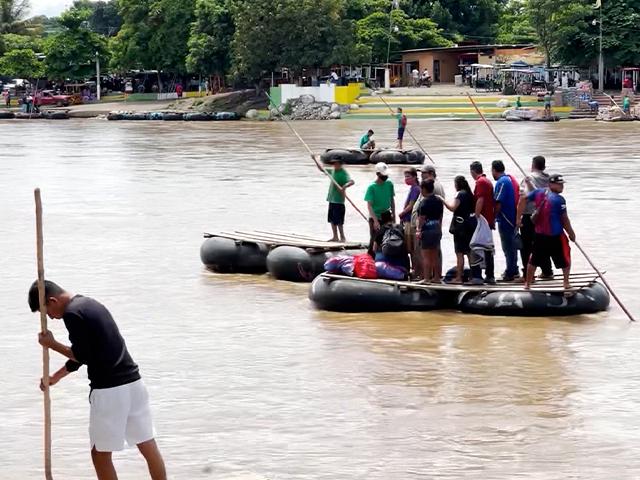
TAPACHULA, MEXICO – Of the nearly 200,000 migrants coming to the US southern border each month, an increasing number are what’s called “extra-continentals.” They’re coming from around the globe, and they’re getting helped on their way by an unlikely source.
On her June trip to Guatemala, Vice President Kamala Harris’ message to illegal migrants was a clear reversal of the Biden administration’s previous messaging.
“I believe if you come to our border, you will be turned back. Do not come. Do not come,” Harris said.
That suggestion doesn’t appear to be working especially on the Mexico/Guatemala border, in a place appropriately named “Smuggler’s Path.”
The Suchiate River is very high right now because it’s the rainy season. People often make the dangerous trek on foot during the dry season. During the rainy season, migrants have to use boats to cross between the two countries. It’s technically illegal, but local people use boats to get to work or to go shopping in one country or the other. Now, however, if the crossers are migrants, they have to turn themselves in on the Mexican side.
Migrants cross the river at a rate of thousands per day, choking the streets of Mexico’s southernmost city, Tapachula.
Most of these migrants are not fleeing persecution, a claim required to qualify for asylum in the US. Generally speaking, the goal is simply the search for a better job. And that’s where true family separation begins.
Jairo, a Guatemalan migrant said, “I just called my wife, and when I called them, I was crying because I hear my little son crying, ‘Dad, come back.’ But I can’t.”
The major drivers behind this wave are groups dedicated to streamlining illegal immigration into the US. That includes the U.N.-affiliated International Organization for Migration, which employs more than 9,000 worldwide and has a budget of almost two billion dollars. Its stated mission is to promote humane and orderly migration, which is helped along by tens of millions of US taxpayer dollars and grants from the likes of George Soros’ Open Society Foundation.
On the walls of the buildings that face the river are huge signs directed at the migrants. One of them says: ‘If you are in fear of your life in your country, you can ask for protection as a refugee in Mexico.’ What they’re trying to do is put people into the system. And one of the things that’s changed from previous years is that today there’s a process and a system.
And international criminal organizations are also getting in on the action, gleaning large payoffs every step of the way. Michael is a 12-year-old Haitian working his way north from Chile, where his family had been living for years. Joe Biden’s election convinced them to head to the United States.
“They raped many of the women. They robbed all of us. Then they wanted money to take us to the refugee camps,” Michael said.
His 16-year-old sister Madeisy was nearly raped on the journey.
“I told the thieves not to touch me because I am a virgin. One of them laughed and told me ‘I’m in charge here, I can do whatever I want,'” Madeisy said.
Madeisy’s mother saved her by handing over her jewelry. Other women weren’t so lucky.
“They raped many women in my group,” Madeisy said. They hurt some and beat them. It was very scary. Some women had husbands or children, but they raped them anyway. Some women even died later from the stress of what happened.”
As more than 5,000 migrants pour across the southern border each day, changes in US policy are having profound effects throughout Latin America and beyond. And the cost in human misery is beyond reckoning. Despite the dangers, it’s likely these migrants will keep coming as long as they believe they will be allowed to stay in the United States.
The remainder of this article is available in its entirety at CBN